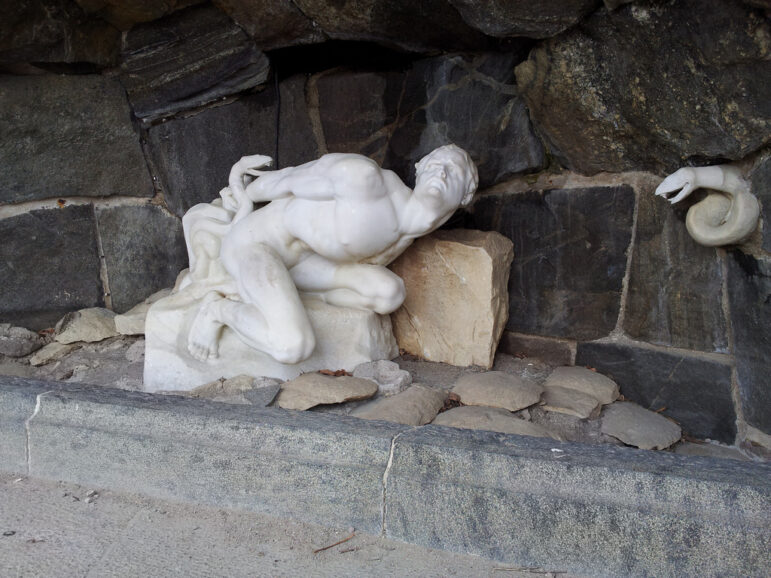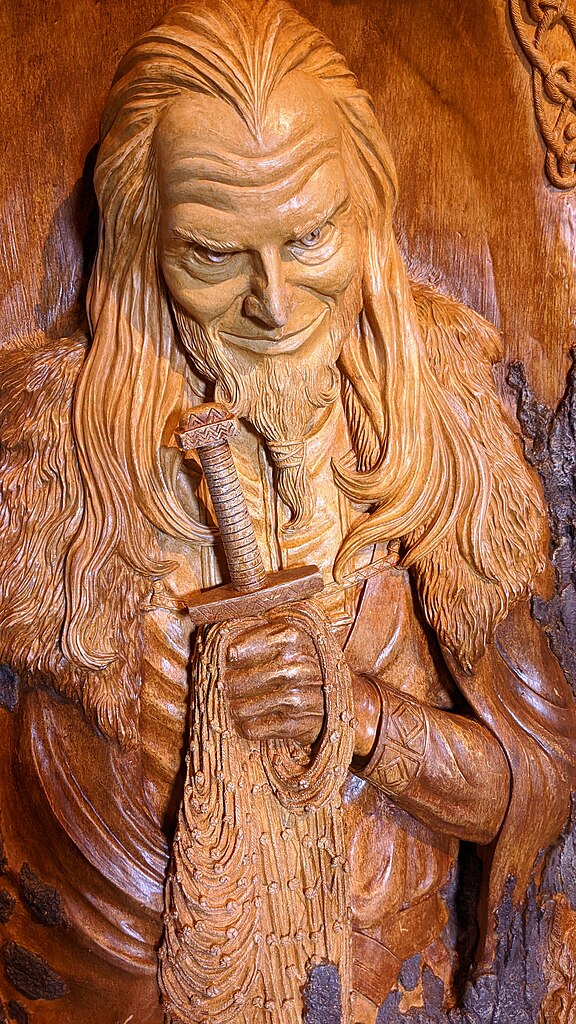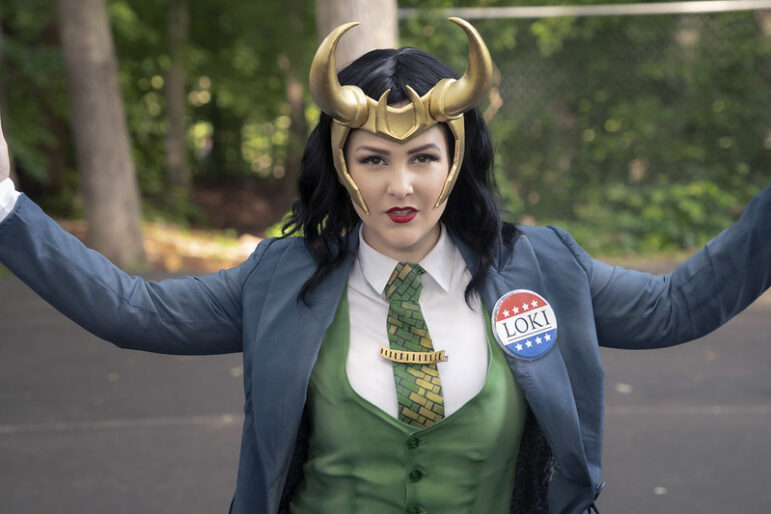
It felt like cracking open.
I shoved both fists against my sternum and howled in pain, curled around myself in the instinctive pose of a mammal who has no other way to protect their softest parts. “It’s too much,” I cried – angry, pained, out of options. “It’s too much. You should know better, you should know I have limits! Why do you always push me so hard?”
Loki said nothing. Or, at least, I didn’t hear him. I was on my couch, fabric crumpled beneath me, too overwhelmed to listen to anything but the physical world, the instincts that were grounding me in the animal parts of my body. It was the kind of night where tears came in waves until I fell asleep and then washed me past dreams and into the silent darkness of exhaustion. I woke up the next morning feeling hollow and phlegmy and wondering, for the first time in years, if this was the right path for me after all.
The thought was a terror in its own way. Like so many others, I had found Paganism through Loki, and while my practice grew over the years he had always been at the heart of it. I didn’t know what my life would look like without him – but at the same time, we had reached a point where I wasn’t sure that we were on the same side anymore. He was my fulltrui, my fully trusted one – and I didn’t trust him.
I couldn’t look directly at the idea. The Bound God was so important to me that I had built him into my name. We would simply have to learn how to disagree, that was all. I told myself that it was probably healthy, that he would want me to grow and change and that, if I had different values now, I’d learn how to incorporate that into my practice. After all, his myths are filled with loved ones who disagree with him vehemently. I could benefit from learning some of those lessons.
It was Loki, a week later, who pressed the issue. “This hurt my feelings,” he said, cards flat against the table. Then, “It’s alright if you don’t want to work together anymore.”
I stared at the reading, the hollow bell of my chest tolling as if it had been struck. His altar was the first thing I had unpacked in my new house. What was I, if I was not a Lokean?

Lokes straff (1923) by Ida Matton in the Stadshuset in Stockholm, Sweden [MjauMjauMjauMjau, Wikimedia Commons, CC 2.0]
When I first became a Pagan, I thought that the tearing pain of change was inevitable, a sign of the process working correctly. I was used to important things being painful, especially if they happened on the way towards finding a better version of myself. It was a natural part of the cycle. Even when I had some inking of the lesson that I needed to learn, it took the too-familiar pop of a ligament pushed too far, a bone stressed into jagged snaring edges, to really drive it home. It took me years to believe that there was a way to grow that involved ease, or at least less discomfort – and even then, I couldn’t quite figure out how to go about it.
So I leaned on Loki. He had been through worse, after all – and I fully believed that, with his help, I’d come out the other side a better person. Surely this was for the best. I put down no boundaries, I never said “enough.” I decided that the pain was worth it, and I pushed myself to take it unblinkingly, to do the hardest thing as long as I knew it was the right one.
The specifics of how I got hurt don’t matter. It was inevitable that it would happen, inevitable that I would someday hit the point where strain and effort become damage. I had taken no responsibility for my own safety, and so when the pain came I lashed out at the person who I had given the responsibility to. I snarled and snapped like a beast in a trap, believing that I was too small to do any damage, that I had no responsibility in this either, that I was helpless against the designs of a god.
It was shocking – it was paradigm shifting – to draw blood. I have been a hard polytheist for a long time, sure that the gods are people with their own motivations and machinations. Somehow, I had never expected them to have feelings – or at least, not ones that I could hurt.
If the Adversary of the Aesir cared enough that my anger could hurt him – what else was I wrong about?

Loki at EPCOT Center’s Norway Pavilion [Eden, Janine and Jim from New York City, Wikimedia Commons, CC 2.0]
So we worked on it. Over the next few months we sat with the hurt between us, setting aside time to talk in more depth, and more directly, than we had in a long time. It felt stilted – not the old and immediate connection but a slow work of building, both of us looking for common ground to build from. I reread the myths, tried and failed to write about him, turned my life over trying to find where he fit, now.
This is about when season two of Marvel’s Loki dropped.
![]()
We hate to keep asking, but it is serious. Costs have hit us too.
We are grateful to our readers for your support, however it manifests. Right now, we need readers who can help fund Pagan journalism to help us continue serving the community. This is the type of story you only see here. This is how to help:
Tax Deductible Donation | PayPal Donations | Join our Patreon
We remain one of the most widely-read news magazines within modern Paganism, and our reporters and columnists remain dedicated to a vision of journalism for and about our family of faiths.
You can also help us by sharing this message on your social media.
As always, thank you for your support of The Wild Hunt!
![]()
I wrote about season one when it came out in 2021, and didn’t have many kind things to say about it. If anything, season two was worse. The plot – what little there was of it strung between McGuffins and pointless chase scenes – stumbled along for five episodes, lent interest by the incredible and underused cast. It was the sort of mess that I had come to expect from the worse end of Marvel’s Disney + television shows – contrived, confused, and marching inexorably toward some plot development that I would stop caring about before it inevitably received its 30 second nod in a movie two years later. To add insult to injury, by far the best thing about the series was Jonathan Majors, who was currently on trial for domestic abuse.
I watched it, as I’ve watched more than a few Marvel properties, out of a sense of obligation and distant curiosity right up until the last episode.
As I’ve said before – I had never associated the Loki character in Marvel’s lore with the god I knew. So I was more than a little shocked to watch the show turn from a hastily assembled series of plot points into the character’s apotheosis.
It started a few minutes into the episode, with the sudden power-up that brought Loki onto a really godlike level, moving back and forth through time, learning a million variations on a moment and centuries’ worth of experience that other characters had no insight on. But the moment it hit me was later, while Tom Hiddleston clutched a microphone and urged another character forward through a difficult and dangerous task.
“You’re doing really well,” he said, utterly calm and utterly focused, gentle and supportive with everything on the line. “Don’t put that down, I told you – it will break. Just keep going. You’ve got this.”
Suddenly this was someone I knew – a god who had run every angle, played through every possibility, and had decided that it was alright to be on the losing side as long as everyone else got the chance to win. He was conflicted, certainly, and tired, but he was willing to lose everything to ensure that free will was the organizing principle of the cosmos.
By the end of the episode the character was bound, and his binding both secured the safety of the many worlds and ensured a war with the power to end everything. He sat in the center of every Marvel story, filling it with his energy, powerful beyond imagining and unable to intervene.
“Are you…” I asked the empty room, beaming with shock and delight. “Are you the god of Marvel, now?”

Nat Archaic cosplaying as Loki [greyloch, Flickr, CC 2.0]
The episode didn’t fix anything – didn’t address any hurts, didn’t clarify the way forward. Mending things is harder than that. But it was the first moment in ages that I had felt connected to my god with joy and excitement, and it shifted my perspective on the hurt I was carrying. It reminded me of why I had found this path in the first place, of the values that had called me to Loki and the love that had kept me there. For an hour, watching the finale to a truly terrible tv show, I found some wonder in my spirituality again, and I laughed at how very fitting it was to come back to the Goat Thief through laughter.
The lessons on this path are hard. I am still struggling with boundaries, and with my own power, and with feeling truly free. I’m very lucky to have someone who will be watching me struggle forward, focused and urgent and supportive as I dare some terrible risk.
“You’re doing so well,” he says. “One foot after the other. You’re being so brave.”
The Wild Hunt is not responsible for links to external content.
To join a conversation on this post:
Visit our The Wild Hunt subreddit! Point your favorite browser to https://www.reddit.com/r/The_Wild_Hunt_News/, then click “JOIN”. Make sure to click the bell, too, to be notified of new articles posted to our subreddit.